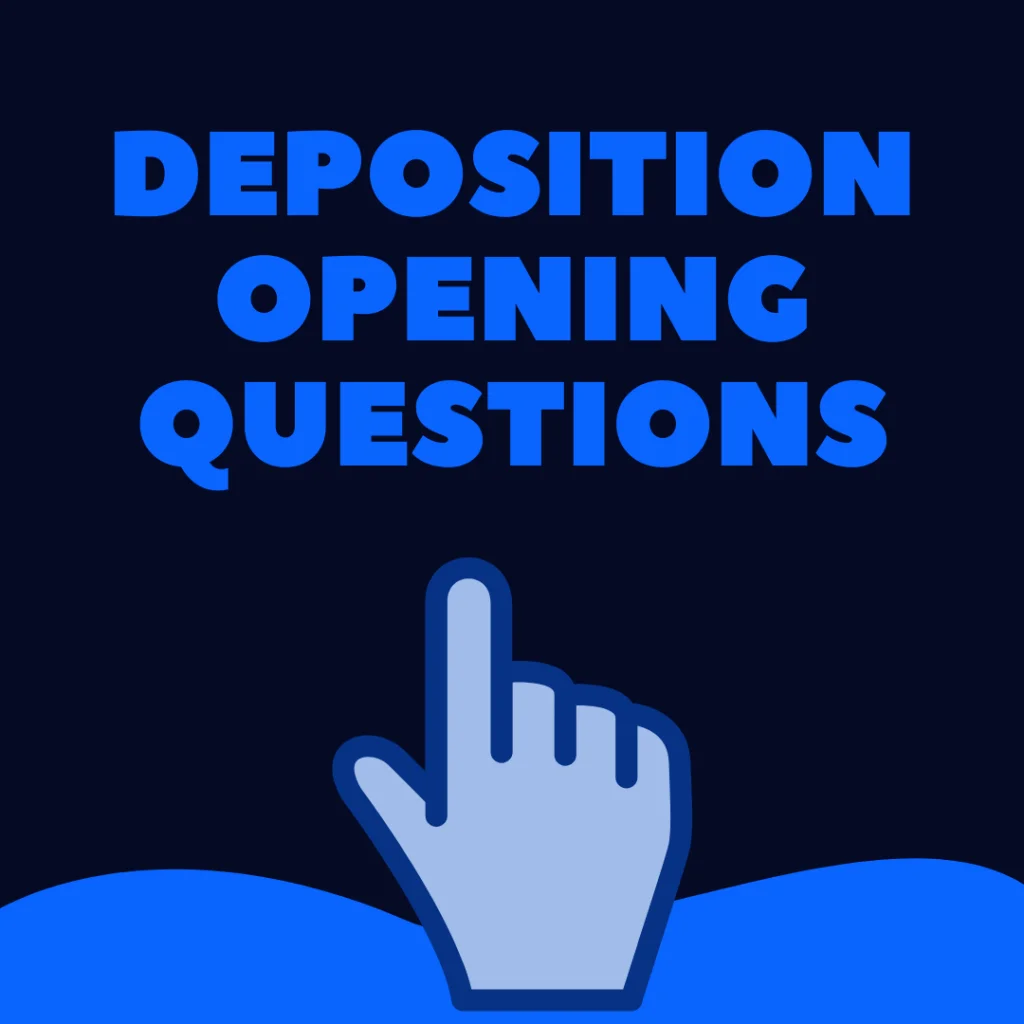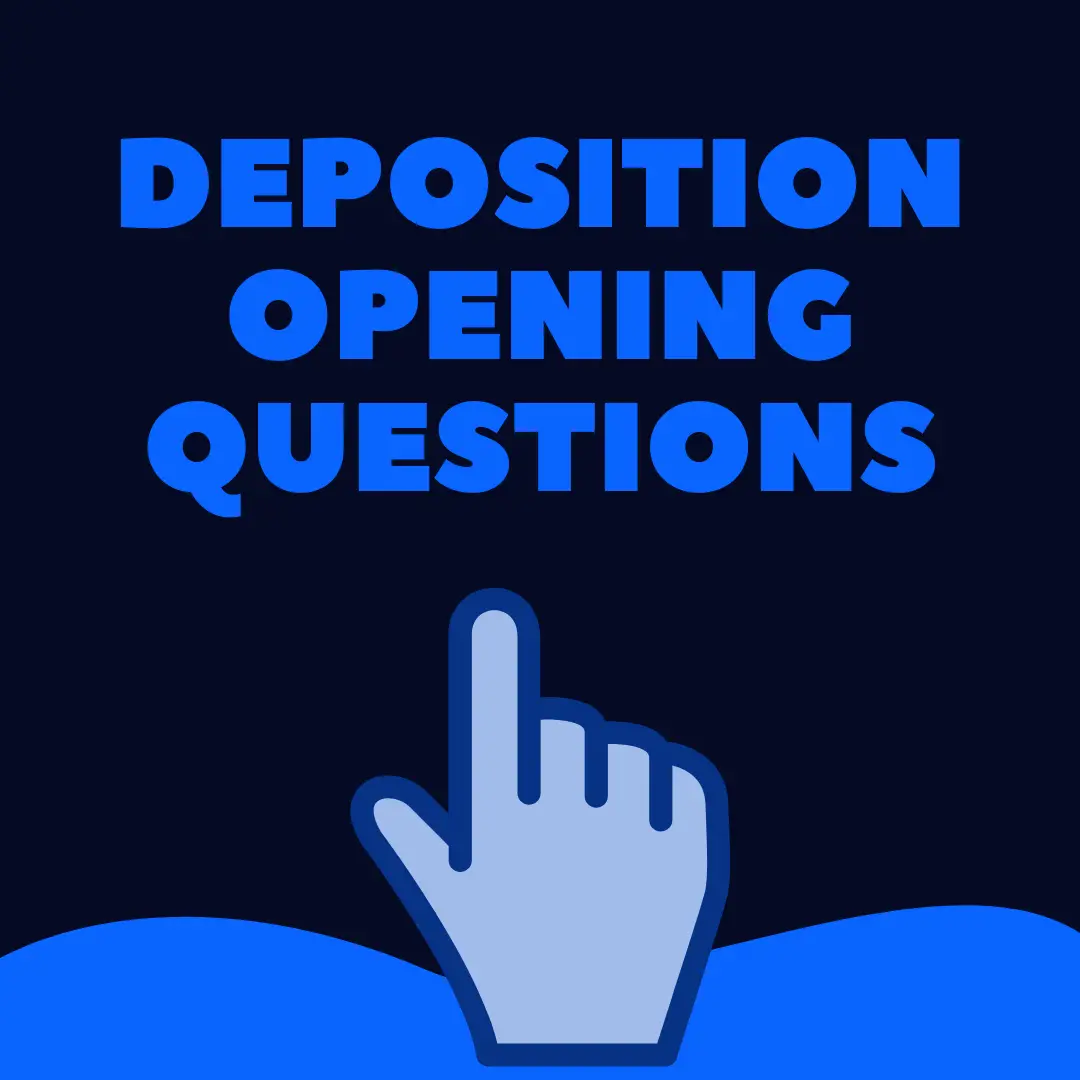The beginning of a deposition is something that experienced lawyers give little thought to.
After a few years of practice, most of the beginning of a deposition has been memorized, and becomes a habit.
But for some who has never participated in a deposition before, the beginning of a deposition might not make much sense.
It often involves the lawyer talking, and not really covering anything that seems too pertinent to the case.
The start of a deposition is actually quite important, and is heavily scripted with a purpose, as the start of the whole proceeding can determine how the rest of the questioning will proceed.
Deposition Opening Questions (Explained)
Disclaimer
The contents of this web page are for informational purposes only, and nothing you read is intended to be legal advice. Please review our disclaimer about law/legal-related information on this website before taking action based upon anything you read or see.
The Purpose Of Opening Questions In A Deposition
Deposition opening questions have a few really important purposes.
First, deposition opening questions establish in the transcript for the record what is happening and who is present, so that the transcript can later be used as evidence in the trial if admissible.
Second, deposition opening questions lay out the ground rules so that the attorney and person answering the questions can make a good, understandable transcript.
Most people have never given a deposition before, and they need to realize that it is testimony, not a conversation.
The witness is under oath, present usually pursuant to a subpoena.
This means that they need to know that answering questions is not option, and that the participants need to wait before speaking to avoid talking over each other.
Third, you use opening deposition questions to help the witness get into the rhythm of listening to your questions and then answering them.
If you hit the witness with the hard questions first, you probably won’t get as much information out of the witness as you will if you waited and warmed them up a bit with questions that are easy to answer.
Starting The Deposition: Basic Opening Statement
Many lawyers start out the deposition with a short statement, usually one that they’ve prepared in advance and recite each time that they start a deposition.
They’ll state the name and case number of the pending lawsuit, state who they are, who they represent, where this deposition is taking place.
They’ll explain that, because they represent the other party, that they cannot provide the witness with legal advice or answer questions of a legal nature, though they will do whatever they can to help the witness through the deposition.
Do you understand that I’m not your lawyer?
Do you understand that I cannot give you any legal advice?
They’ll let the witness know that the witness can ask to take a break at any time, so long as the break is not between a question and an answer (presumably to prevent the witness from going out to individuals in the waiting room to talk about what to say, or to call someone).
Do you understand that you can ask to take a break at any time, so long as the break is not between a question and an answer?
And that if you want to take a break after you answer a question, you are welcome to come back after your break and attempt to answer the question again?
They’ll remind the witness that all answers must be recited out loud, as the court reporter does not transcribed head shaking or head nods.
They’ll ask the witness to answer questions with a clear yes, no, or words of explanation, as “uh huh” in a transcript is often very close to “uh uh.”
They’ll ask the witness if she understands, and then if the witness doesn’t state “yes” clearly, will ask again, with a clarification for a “yes or a no.”
They’ll ask the witness to listen to the question fully before answering, and to understand the question fully before answering.
They’ll also ask the witness to let the lawyer finish asking the question before answering so that the transcript is clean and clear.
They’ll state any other ground rules, and then when everything is done, they’ll ask the witness if he/she heard everything, and then understood everything.
Finally, ask: do you understand that you’ve taken an oath to tell the truth? And that the oath means that you’ve promised to tell the truth? And that this testimony could be used later in court?
Initial Questions To The Witness To Set The Stage
Here’s a list of the initial questions an attorney might ask a witness at the start of the deposition tp help the witness get comfortable and learn how to answer questions without talking over the attorney:
What is your full legal name?
How do you spell your first, middle, and last name?
What is your date of birth?
Can you hear me?
Can you understand the words that I am speaking?
If you can’t hear something I’ve said or understood something I’ve said, do you promise that you’ll tell me that you didn’t hear or understand what I said?
Because you’ve said, yes, you understand that I’m going to assume that if you answer a question I’ve asked you, that I and other people reading this transcript will assume that you heard and understood the question before you answered it?
Are you taking any medications that might prevent you from hearing, seeing, or understanding anything that will happen in this deposition?
Are you under the influence of any substance at this time that might impair your ability to understand or answer questions today?
Do you take any medications? What are they? Did you take any of those medications in the last 24 hours?
When was the last time you consumed alcohol/marijuana/other substance?
Have you ever given a deposition before? (Get who, what, where, when, and how)?
Have you ever testified as a witness in a trial before? (Get who, what, where, when, and how)?
Are you ready and prepared to answer my questions here today?
Next Stage Of Questions: Get The Witness Comfortable Telling You Easy Things
Have you ever used any other names? (Maiden names, nick names)
Where were you born?
What is your social security number?
Do you have a driver’s license?
What is the state and license number? (let them get out the license and read it)
What’s your current address?
How long have you lived there?
Who lives in the house with you?
Where did you live before?
What was the address?
Do you have children?
What are their names?
How old are they?
Are you married?
What is his/her name?
Is your spouse employed? Where?
Have you ever been divorced?
When, where, what, who and how (re: divorce)?
Have you ever declared bankruptcy?
(When, where, what, who and how (re: bankruptcy)?
Are you currently employed?
Where is that?
What is your job title?
What are your primary job duties?
How long have you worked there?
Do you have a supervisor?
What is his/her name?
Where did you work before?
Did you finish high school? What school?
Did you attend any additional school, such as college, trade school, or continuing education type classes for work?
Do you awarded any degrees or certifications?
Now Into The Nitty Gritty Types Of Questions (Before Getting Into The Facts Of The Specific Case)
Did you file taxes in the most recent year? Then previous years?
Have you ever been convicted of a crime? (Get when, where, who and how details)
Have you ever been arrested? (Get when, where, who, and how details)
Have you ever had a case expunged or cleaned off your record? (Get when, where, who, and how details)
Have you ever been a party in a lawsuit before? (Get who, what, where, when, and how)?
What did you do to get ready for this deposition?
Did you read any documents to get ready for this deposition?
If not, is there any documentation that you would look to review to answer questions in this deposition?
Have you made any personal notes (electronic or hand written) about this case?
Have you spoken to your spouse about this case? (Get who, what, where, when, and how)?
Have you spoken to any reporters or journalists about this case? (Get who, what, where, when, and how)?
Have you spoken to any member of law enforcement about this case? (Get who, what, where, when, and how)?
Have you spoken to anyone else about this case? Who? When? What did you tell them?
If the witness is not the opposing party, ask him/her if she has spoken with opposing counsel. If yes, ask him when, where, and what they spoke about. Ask him what opposing counsel told him, in ad much detail as possible.
Do you know any of the people involved in this case personally? Have you ever met ________________ (go through each person) before?
Then, you should be ready to jump into the details that are relevant to the facts of the case.
Wrap Up
Does it make it a better justice system when all the judges are former prosecutors? That’s another question entirely.
Want to learn more about your criminal justice system?
Browse our free legal library guides for more information.
You might also like:
- What Does an Amended Charge Mean?
- Can The Prosecutor Call The Defendant As a Witness?
- Can a Prosecutor Date a Defense Attorney?
- Can a Prosecutor Also Be a Defense Attorney?
- When Does a Prosecutor Give Closing Arguments?
- Do Prosecutors Always File Charges?
- Can You Accept a Plea Deal During Trial?
- Can Co-Defendants Have Contact?


